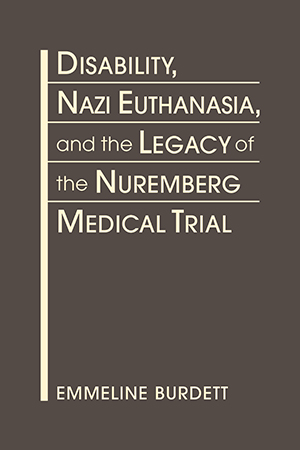
- 2024/181 pages
- Disability in Society
Disability, Nazi Euthanasia, and the Legacy of the Nuremberg Medical Trial
Hardcover: $89.95
ISBN: 978-1-68585-283-2
Ebook: $89.95
ISBN: 978-1-68585-977-0
During the Nuremberg Medical Trial (1946-1947), the perpetrators of the Nazi euthanasia program were barely prosecuted. The program, also known as Aktion T4, was essentially a campaign of mass murder, designed to cleanse society of individuals who were deemed undesirable: incurably ill, physically or mentally disabled, or simply old. Emmeline Burdett's close reading of the trial transcript and her careful parsing of the legacy of Aktion T4 are the genesis of this revealing book.
Set against the backdrop of the experiences of people with disabilities during the Nazi era and then the unfolding of the medical trial, at the heart of Burdett's book is an exploration of the subsequent impact of the program—how it has influenced debates about euthanasia and related ethical issues across decades. In a sweeping narrative, she shows how both the dismissive attitude that many commentators have had to the program and the assumption by many disability activists that it is relevant to every disability-related ethical issue (i.e., the Nazi analogy) continue to have harmful, even catastrophic, repercussions.
Set against the backdrop of the experiences of people with disabilities during the Nazi era and then the unfolding of the medical trial, at the heart of Burdett's book is an exploration of the subsequent impact of the program—how it has influenced debates about euthanasia and related ethical issues across decades. In a sweeping narrative, she shows how both the dismissive attitude that many commentators have had to the program and the assumption by many disability activists that it is relevant to every disability-related ethical issue (i.e., the Nazi analogy) continue to have harmful, even catastrophic, repercussions.







